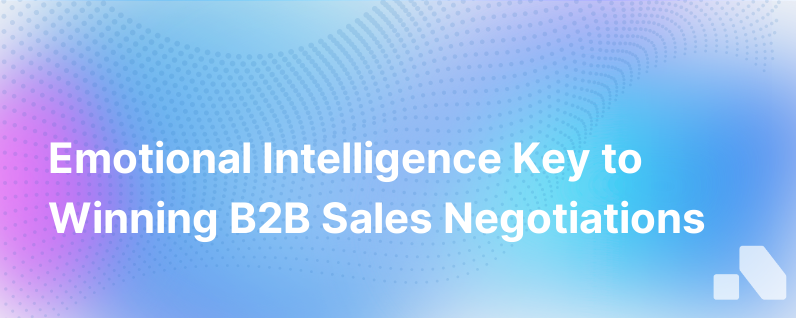
In the competitive world of B2B sales, the ability to negotiate effectively can make the difference between a closed deal and a missed opportunity. Beyond the grasp of persuasive tactics and understanding of industry trends, lies a crucial yet sometimes underappreciated facet of negotiations: emotional intelligence (EI). Emotional intelligence - the capacity to be aware of, control, and express one's emotions, and to handle interpersonal relationships judiciously and empathetically - has a profound impact on sales processes for several compelling reasons.
The Human Element in B2B Transactions Even in B2B scenarios where the focus is often perceived as being on the product or service specifications and ROI, deals are still made between people. The capacity to understand and respond to the emotions of decision-makers in target companies can significantly influence their willingness to negotiate and collaborate.
Sales representatives equipped with a high EI are adept at reading non-verbal cues and adjusting their pitch to address not just the spoken but the unspoken concerns of their potential clients. When sales professionals empathize with their clients, they're able to frame their product or service as a solution to the client’s specific worries, fears, or desires.
Building Trust Through Emotional Intelligence Gone are the days when high-pressure tactics could seal a deal. Today, B2B sales are about building and maintaining relationships, which calls for trust as a foundational element. Salespersons with high emotional intelligence inspire confidence not only because they exhibit an understanding of their clients' needs, but also because they project sincerity, reliability, and integrity. The development of trust is often cited as one of the most critical outcomes of EI in sales, providing an invaluable platform for all subsequent negotiations.
Managing Emotions During Negotiations The journey of B2B sales is fraught with potential for conflict and confrontation. Competent negotiation requires remaining calm and collected, no matter how challenging the situation becomes. The self-regulation aspect of EI is invaluable here, empowering salespeople to stay poised, keep the discussions on track, and prevent personal reactions from undermining the negotiation process.
Furthermore, emotional intelligence facilitates conflict resolution by allowing sales reps to de-escalate tensions and find mutually beneficial solutions – a coveted ability in any B2B sales negotiation, as it nurtures a positive experience and lays the groundwork for future partnerships.
Adapting to Each Unique Client EI also plays a role in the flexibility of a salesperson. Being able to interpret the emotional dynamics of a negotiation enables a rep to adjust their strategy in real-time, catering to each client's unique set of values, pressures, and expectations. This kind of adaptability is often what turns a potentially stagnant negotiation into a dynamic exchange with favorable results.
The Pitfalls of High Emotional Intelligence Despite its numerous benefits, it's worth noting there can be pitfalls associated with high levels of EI. For instance, overly empathetic salespeople might inadvertently make excessive concessions in a bid to maintain harmony or avoid conflict, which can harm the negotiation outcome.
Additionally, high empathy could potentially blind a salesperson to the strategic aspects of a negotiation, leading them to overlook opportunities for value creation in favor of resolving emotive concerns.
Cultivating Emotional Intelligence in Sales Teams The good news for organizations is that, unlike intrinsic attributes such as personality, emotional intelligence can be developed. This involves providing sales teams with training in areas like listening skills, self-awareness, and emotional regulation. Organizations can also evaluate and track the emotional intelligence of their sales personnel, incorporating it into performance metrics and professional development plans.
The Verdict Ultimately, emotional intelligence is a key differentiator in the world of B2B sales negotiations. As a multi-faceted skill set that enhances communication, fosters trust, and fosters long-term relationships, EI goes beyond sales strategy to touch the very core of what makes us human — our ability to connect with others.
For forward-thinking organizations, a commitment to nurturing emotional intelligence among sales teams is not just a nice-to-have, it's a strategic imperative. This investment is one that pays dividends that reach far beyond the immediate close, fostering a culture of empathetic, customer-centric selling that can become one of an enterprise's most formidable assets.
Aomni and Emotional Intelligence in Sales While Aomni cannot directly enhance a sales representative’s emotional intelligence, it serves as a potent tool in aligning the vast array of nuances in account planning and sales strategy with the EQ-driven approach that is essential in today’s B2B landscape. This combination of insightful platforms like Aomni with the nuanced art of emotional intelligence in negotiation is shaping the future of B2B sales, leading to richer interactions, deeper connections, and ultimately more successful partnerships.
Sources:
- The Impact of Emotions in Negotiation | HBS Online
- The Role of Emotional Intelligence in Sales: How to Develop EQ for Better Customer Connections
- Emotional intelligence: Components, importance, and examples
- 4 Ways Emotional Intelligence Can Improve Your Sales
- The Importance of Emotional Intelligence in B2B Sales
- 5 Reasons Why Emotional Intelligence Matters in Sales
- The Importance of Emotional Intelligence in B2B Sales | VAEKST
- (PDF) The Influence of Emotional Intelligence on Negotiation Outcomes and the Mediating Effect of Rapport: A Structural Equation Modeling Approach